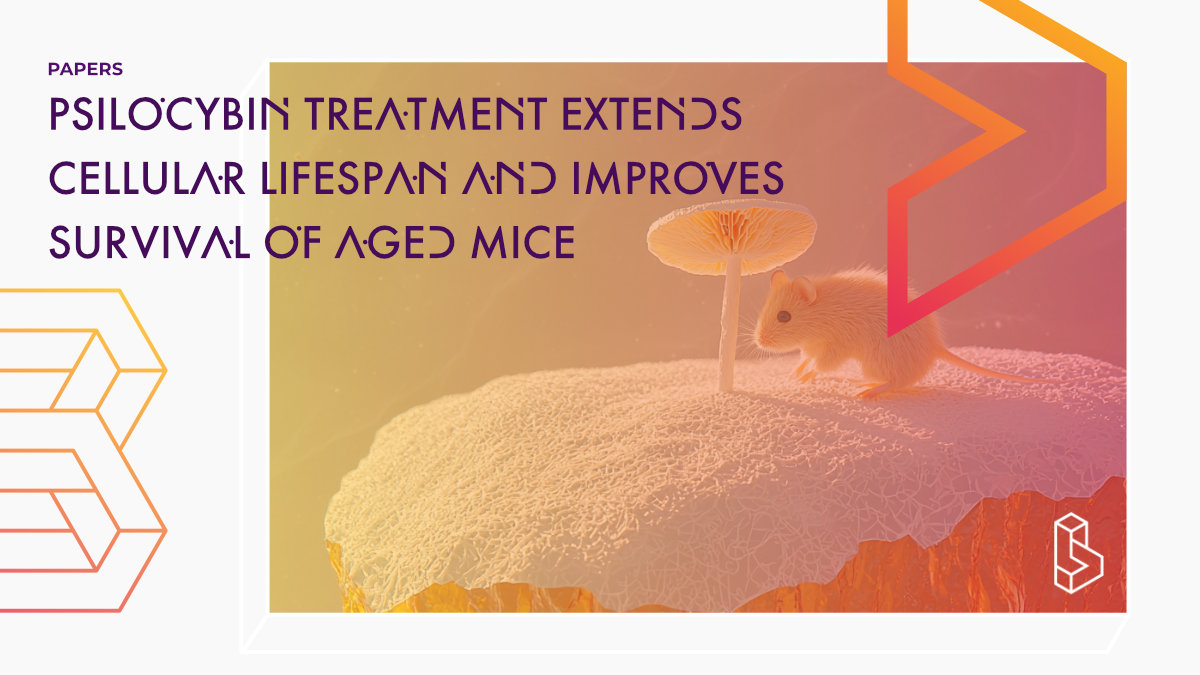This preclinical mouse study (n=58) provides the first experimental evidence that psilocin extends cellular lifespan and that psilocybin promotes increased longevity in aged mice. The findings suggest psilocybin may have geroprotective potential, though the molecular mechanisms remain unclear.
Abstract of Psilocybin treatment extends cellular lifespan and improves survival of aged mice
“Psilocybin, the naturally occurring psychedelic compound produced by hallucinogenic mushrooms, has received attention due to considerable clinical evidence for its therapeutic potential to treat various psychiatric and neurodegenerative indications. However, the underlying molecular mechanisms remain enigmatic, and few studies have explored its systemic impacts. We provide the first experimental evidence that psilocin (the active metabolite of psilocybin) treatment extends cellular lifespan and psilocybin treatment promotes increased longevity in aged mice, suggesting that psilocybin may be a potent geroprotective agent.“
Authors: Kosuke Kato, Jennifer M. Kleinhenz, Yoon-Joo Shin, Cristian Coarfa, Ali J. Zarrabi & Louise Hecker
Summary of Psilocybin treatment extends cellular lifespan and improves survival of aged mice
Kato and colleagues begin by outlining the widespread clinical interest in psilocybin, the psychedelic compound found in certain mushrooms. Psilocybin is being investigated in over 150 clinical studies, primarily for psychiatric and neurodegenerative conditions such as anxiety, depression, addiction, and Alzheimer’s disease. Despite its therapeutic potential, the molecular mechanisms by which psilocybin exerts its effects are still poorly understood. Most existing research focuses on neurological and behavioural outcomes, leaving its broader, systemic effects largely unexplored.
The authors refer to a growing hypothesis—the “psilocybin–telomere hypothesis”—which proposes that psilocybin may affect biological ageing by influencing telomere length. Telomeres are protective structures at the ends of chromosomes that naturally shorten with age and stress, contributing to cellular ageing. Shorter telomeres are associated with depression, anxiety, and chronic stress, while longer telomeres correlate with better mental health. Given psilocybin’s effects on mood and stress, it is plausible that it may also impact telomere biology, potentially offering anti-ageing benefits. However, no studies prior to this had tested psilocybin’s effects on biological ageing mechanisms in a controlled experimental setting.
Cellular Studies (In Vitro)
To investigate psilocybin’s potential anti-ageing effects at the cellular level, the researchers used a well-established laboratory model known as replicative senescence. In this model, human lung fibroblasts—cells commonly used in ageing studies—are cultured repeatedly until they naturally stop dividing, a process mimicking cellular ageing. Instead of psilocybin itself, the researchers used psilocin, the active metabolite formed in the body after psilocybin ingestion.
Find this paper
Psilocybin treatment extends cellular lifespan and improves survival of aged mice
https://doi.org/10.1038/s41514-025-00244-x
Open Access | Google Scholar | Backup | 🕊
Cite this paper (APA)
Kato, K., Kleinhenz, J. M., Shin, Y.-J., Coarfa, C., Zarrabi, A. J., & Hecker, L. (2025). Psilocybin treatment extends cellular lifespan and improves survival of aged mice. npj Aging, 11, Article 55. https://doi.org/10.1038/s41514-025-00244-x
Study details
Compounds studied
Psilocybin
Topics studied
Neuroscience
Study characteristics
Animal Study
Bio/Neuro
Participants
58
Rodents
Cells
Compound Details
The psychedelics given at which dose and how many times
Psilocybin 10 - 100μg | 1x Psilocybin 5 - 15
mg | 10x

